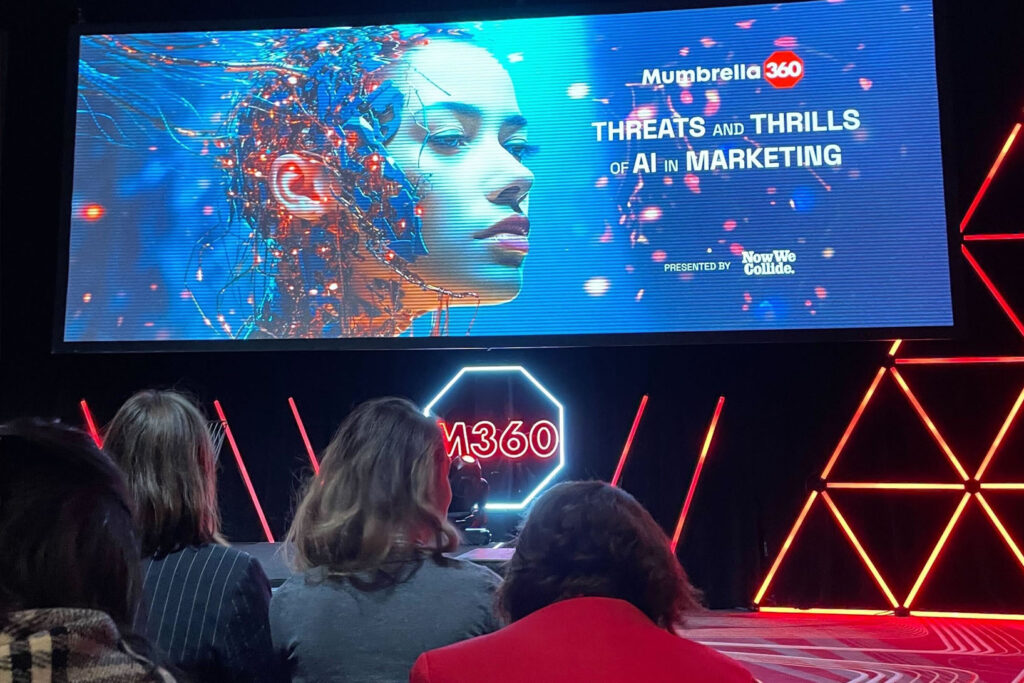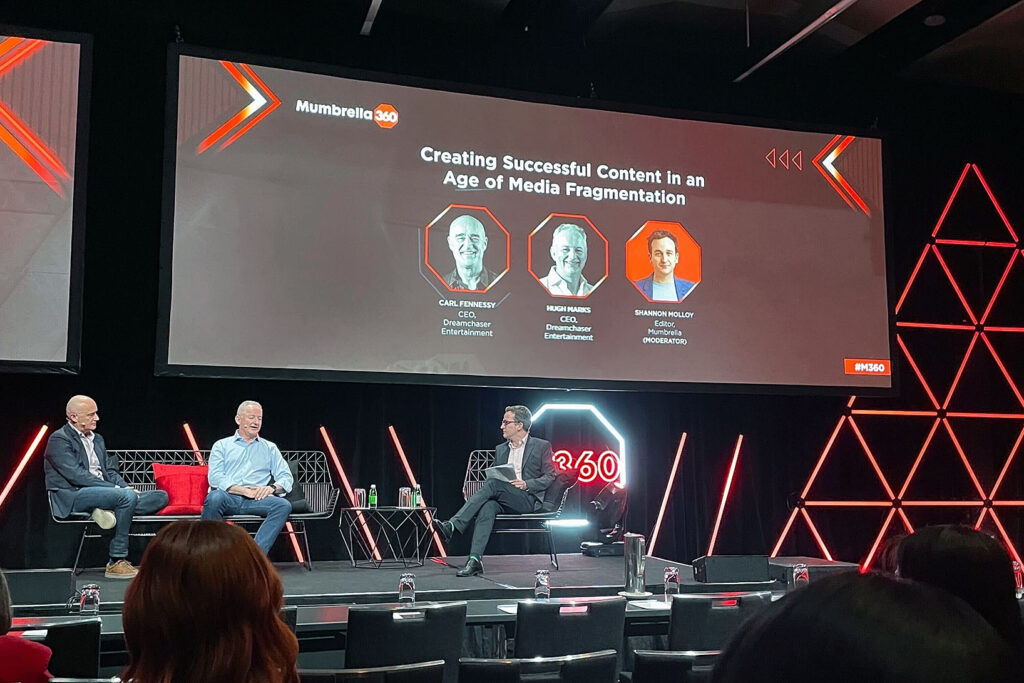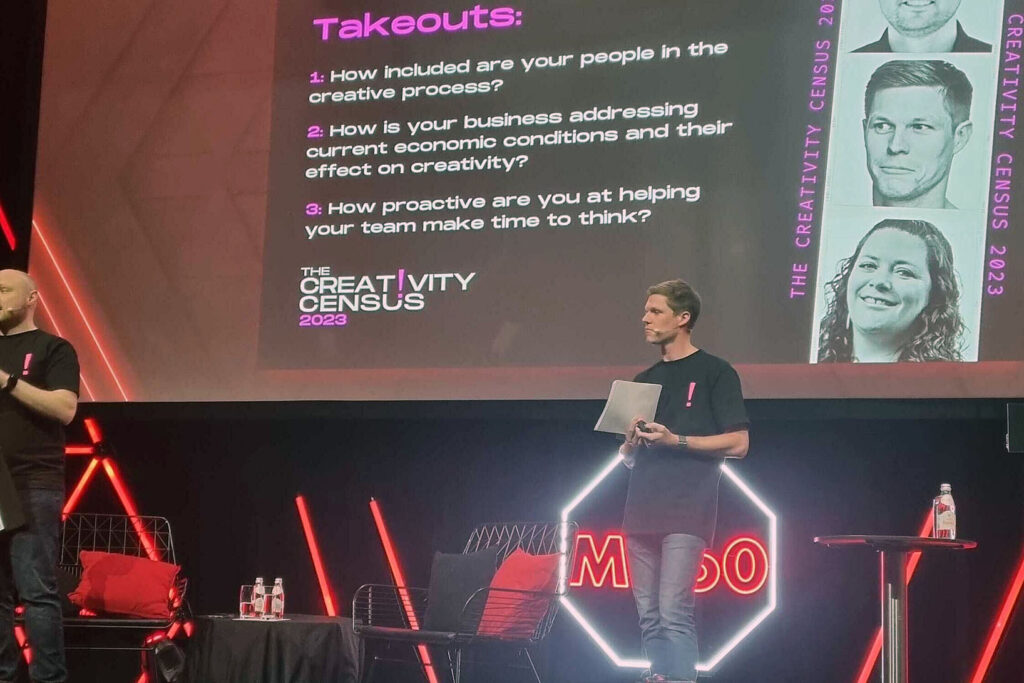Inspiration for shaping a more sustainable future at Mumbrella360
August 1, 2023
There’s nothing like a work trip to a super inspiring event in another city (and a few cocktails) for a sparkling mid-year refresh. In line with our brand refresh, T&G’s lead strategists Tegan and Millie ventured north to Sydney in July to attend Mumbrella360 – Australia’s largest media and marketing conference. They had an absolute ball and returned to Melbourne, reinvigorated and bursting with ideas to share. Let’s hand it over to them.

A distinct openness, connection and camaraderie filled the conference rooms. Outside those walls, we’re highly successful people in brands and agencies that often compete with each other, but inside, we were just a bunch of people with a shared passion for this thing we love doing: helping brands communicate their message. The conference covered three main themes – levelling up today, embracing tomorrow, and standing up for people and the planet. It was incredible to be out of the context of our own agency and hear from the industry’s brightest minds about these values and new ways of working that align with the new direction we’re taking with our own brand.
Levelling up today
Hugh Marks and Carl Fennessy are CEOs of newly-formed Australian content studio Dreamchaser Entertainment. They discussed how, in this age of global content and mass consumption, consumers are more discerning, which leads to higher expectations for ‘good’ content. With strong competition to get even a few seconds of attention, how do we define what ‘good’ content actually is? It’s similar but different, familiar but distinctive. It’s a tricky brief for any brand, but it’s ultimately what sets our brands apart. Hugh and Carl argue that we need to continue trying to strike this balance if we hope to continue capturing such diverse and evolving audiences.
A similar message was reinforced in a Q&A with Chris Howatson (CEO of Howatson + Company agency) and Margie Reid (CEO of award-winning creative agency Thinkerbell). They spoke about their experience taking the leap of faith from their holding companies (network agencies) to building their own indie startup agencies and how their brand difference came from something other than a good brief – instead, working towards a solid approach, cohesively.
This resonated with us because, at our core, we love creative problem-solving and digging deep to uncover the true problem with any business. The General Store’s Chief Creative Officer, Marcus Tesoriero, spoke precisely to this. He emphasised the importance of finding the true problem to be solved, and it’s pretty simple – ask, listen, and collaborate. He also shared a few tips for solving problems differently, including:
- Stepping outside your local competition and benchmark yourself against world-class work.
- Leading a process that cultivates creative ideas and documents every good idea.
- Developing a structure for regular collaboration with clients through idea labs.
We then went back to basics with Richard Curtis, the CEO of FutureBrand, who said, “The purpose of a business is to create and keep a customer; the purpose of a brand is to help that customer and employees choose your business”. Richard added that a brand may be created with purpose but ultimately defined by the experience. This connection between your brand’s purpose and the everyday experience gives you a competitive advantage. We couldn’t agree more.

Embracing tomorrow
There are many brands out there that claim to have a ‘culture of innovation’. This is a fancy way of saying they create space for creative problem-solving and nurture new ideas, but this is often easier said than done. There were some great discussions at Mumbrella360 around emerging marketing, media, and communications trends and tomorrow’s technology, focusing on the importance of harnessing creativity to power a culture of innovation.
Wade Kingsley and Ben Lucas from The Ideas Business provided some interesting insights from the Creativity Census 2023, too – it found 82% of respondents worked in an environment that promotes creativity, no surprises there. But, only 13% of respondents said their workplace provided a culture of creativity. Collaborative work grounded in creativity is the birthplace of innovation, so seeing this reality through the census was sobering.
Ryan Bodger and Bob Connelly of Now We Collide brought the inevitable conversation about AI to the event, reaffirming what we at Taylor & Grace think and feel – that the world is full of storytellers and AI is a tool to unlock more ways of doing things, rather than replace the ways we do things now. It’s actually mind-blowing what generative AI can do!

Standing up for people and the planet
This topic resonated deeply for both of us. Not only is doing right by people and the planet part of our agency’s DNA and the focus of our new strategy but it’s also reflected in the type of people we strive to be.
We were blown away by the opening speaker, Azure Antoinette, who spoke passionately and openly about her lived experience and the power of allyship in diversity, equity and inclusion (DE&I). She defined true allyship as ‘caring and acting on something that doesn’t always affect you’ and that the drive should not come from the content team but from within the organisation at all levels. The message was clear: DE&I is never a campaign; it’s a conversation and a commitment.
There were also some really engaging presentations on meaningful partnerships and collaborations. General Manager of social change agency Cox Inall Ridgeway, Yatu Widders-Hunt and Managing Director of ARAHIA Pathfinders, Karl Wixon, spoke about the importance of meaningful partnerships with communities with lived experience and avoiding the systemic issue of cultural tokenism that’s grounded in a competitive mindset. Karl said it perfectly, “It’s about ecosystems, not EGOsystems”. The ultimate partnership is created by coming together with one problem and a blank page to uncover the right solution.
A perfect example is the partnership between the Foundation For National Parks & Wildlife and L’OCCITANE Australia. We heard from Ian Darbyshire, CEO of the foundation, and Pierre Joffre, General Manager of L’OCCITANE, who detailed their partnership to plant one million trees in five years and the reasons why they believe commercial partnerships are crucial in making a difference to the planet. The success of their collaboration has many learnings for the rest of us, including the importance of aligning partnerships with the DNA of your brand, acting locally, engaging internally and externally, thinking about the longevity of partnerships and communications and measuring impact to keep yourself accountable.
So, on the back of Mumbrella360, what was our biggest takeaway?
Indeed, one of the questions we’ve asked ourselves as part of our shift in direction as an agency is how it’s possible for brands to shape a more sustainable future. In our quest to answer this, the event allowed us to see two things: one, that we are on the right path with our new brand direction, and two, that we’re one of many who are compelled to change – to do better and be better for a better world. And we couldn’t be more excited by both.
From taking ownership of our roles and responsibilities as trusted pillars of society and tracking the impact of our work, to harnessing the true power that can come from collaborating and working with those around you who have a shared desire to make change. Providing space for the voiceless by acting on something that doesn’t affect us and talking, developing and nurturing innovation and creativity to uniquely solve individual issues and potentially others along the way.
We’re buzzing with ideas and ways to continue our journey of learning, discovery and evolution.
If you’d like to chat about these ideas or collaborate with us, get in touch.
“
“The purpose of a business is to create and keep a customer; the purpose of a brand is to help that customer and employees choose your business”.
– Richard Curtis,
CEO of FutureBrand
